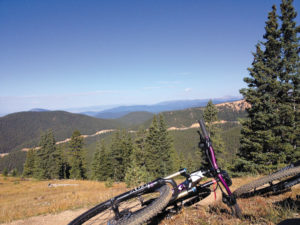What Do Affordable Housing, Equality, and World Peace Have In Common?
By Martha Quillen
A story in the July 6 Mountain Mail made me laugh – until I realized it wasn’t a joke. The article was about how Jackson, Wyoming, planned to address “its worker housing shortage” by establishing a parking lot where workers could sleep without being disturbed or harassed by authorities. An overnight parking space would cost $465 per month, and car campers would be required to keep all activities in their vehicle. Parking lot tenants would not be allowed to sit in nearby chairs or cook on their tailgates, and two porta-pottys and a dumpster would be supplied.
The Mail delved into whether Salida should consider a similar plan, and Reed McCulloch, executive director of the Chaffee Housing Trust said he had never heard of a municipality formally authorizing parking spaces to be used for long-term car camping, and he could foresee several problems.
A local worker who had actually lived in his car thought the idea might have some merit – if the cost could be reduced to $125. And Jim LiVecchi, Salida’s mayor, told the paper it might “help somewhat in the summertime” but wouldn’t resolve Salida’s housing problems.
LiVecchi nonetheless concluded that he’d like to see how this worked out in Jackson. And that seemed like a good idea to me, too. But the Jackson Hole News and Guide and their local government websites don’t reveal much. What is clear, is that Jackson has been considering such proposals for years, despite ample resident disapproval, but instead of coming to fruition, proposals tend to get side-tracked. Also, some of the parking space rules are more onerous than the Mail implies. For example, overnight parking spaces are only available from 7 p.m. To 7 a.m., and have to be vacated every morning so they’ll be available for shoppers.
But perhaps the more telling factor in this novel housing scheme, is that new ideas keep coming and old ones change, and therefore there’s little data on how this could or would work yet. In fact, a new idea was presented to the city of Jackson this August, which calls for a bigger overnight parking area that sounds more like a traditional RV camp, but would cost $800 a month. That amount was quickly mocked for being too high, which is probably true. But charging $465 for an after-prime-time parking space seems steep, too.
Upon first hearing about Jackson’s proposal, I viewed it as one of the most despicable ideas ever advanced. The entire proposal struck me as wrong, degrading, and a terrible precedent. Establishing a campground with shower and bath facilities where workers can talk, hang out, pitch tents, or sleep in their cars or campers is one thing. But requiring them to stay in their car in a parking space?
The Jackson proposal makes Snidely Whiplash seem generous. But leaving workers without any places to sleep is certainly not better. And in retrospect, I suspect my initial outrage was intensified because I was reading a book about growing inequality when I first heard about Jackson’s bizarre housing proposal.
Actually, I read a lot about inequality, because I’m convinced it’s fueling class consciousness, bigotry, and unseemly rhetoric and is thereby escalating our nation’s anger. The Broken Ladder: How Inequality Affects the Way We Think, Live, and Die by Keith Payne reinforces that impression.
Payne, a psychology professor at the University of North Carolina at Chapel Hill, specializes in the psychology of inequality and discrimination, and he doesn’t merely reiterate the standard conclusion that people tend to let bias color their memory and judgment. Payne starts his book by reviewing inequality stats in the United States, then moves on to explain why “feeling poor hurts like being poor.” He then illustrates the pervasive nature of social standing by telling a story about how his pre-school-aged daughter surprised him when she started labeling kids in University daycare as rich and poor. And even more surprising, she was somehow right on the mark in separating the children of professors from those of struggling students. But how did she know?
Payne goes on to discuss how we determine such things, and then switches course with an astounding section about how wrong our stereotypes can actually be. He presents convincing arguments against many of the things we are repeatedly told or just assume, including that America’s poor routinely vote against their own financial interests and mostly Democrats drive Volvos.
But Payne’s book, which I’m only halfway through, contends things that are far more disturbing than that. His most troubling account comes in his assessment of experiments in which people were made to feel superior to their peers. Subjects were given money to make market investments and were told they could keep whatever profits they made. Although they all made similar amounts; half of them were then told they’d done better than 89 percent of the participants and the other half were told they’d done worse. And then the experimenters told subjects that they would like to tax the high earners 20 percent to compensate those who’d made less, but they would let everyone vote on it.
In other words, the researchers belatedly proposed a redistribution scheme. And as expected, the subjects who thought their earnings were inferior wanted to increase redistribution, but they also wanted everyone’s vote to count. Whereas the subjects who “thought they were superior wanted to reduce redistribution, and they also voted to reject the votes of those who disagreed with them. The more they saw the other player as incompetent and irrational, the less they wanted his vote to count.”
I was reading this part of The Broken Ladder as the news about the deadly rally in Charlottesville, Virginia played out on television, and President Trump, FOX, MSNBC, CNN, Democrats, Republicans, activists and government officials weighed in. During the following days, two sides kept proclaiming their superiority, and they actually agreed on something: the other side should be denounced, vilified and soundly defeated.
As I watched the news about Charlottesville with Payne’s book in my lap, it occurred to me that the solution for quelling hatred probably isn’t meeting heavily armed, goose-stepping parade participants with counter protests. Nor does it seem likely that hate will be quashed by smashing statues and talking about assassinating the President.
In the wake of Charlottesville, it’s easy to see how righteous anger builds into fury and people end up blaming and shaming not just the perpetrators but entire populations (of blacks, whites, cops, liberals, or conservatives). But our best course, I think, is not to give neo-fascists the attention they want.
More than anything else I’ve read in recent years, The Broken Ladder sheds light on some of the reasons why so many things aren’t working in Salida, Jackson, or Congress. At the very beginning, Payne says he wants to help people understand “what it is actually like to be an individual living in this time and this place …” And his subsequent pages show why, as inequality grows and rising costs and worry feed a host of consequent inequities and insecurities – people lash out. And when those who are better off urge them to work harder, anger escalates, and people turn on one another.
Payne discusses inequality without finger-pointing, and addresses politics without taking sides, and never discounts the emotions involved. And his calm, empathetic tone convinces me that our primary goal should not be to rail against our presumed enemies, but to reduce hate, anger and pain by diligently addressing its underlying causes: the unfairness, meager opportunities, broken dreams, and everyday difficulties that make people so crazy mad.
And with that, I’ve got a book to finish, and causes to embrace – including reducing inequality; increasing opportunity; and working toward providing livable wages, affordable housing, better access to health care, and equal justice for all citizens; while defending free speech, voting rights, and the importance of every person’s life, regardless of who that person is. Or isn’t. Here’s hoping I can get this starter plan rolling before next month, and start working toward world peace.
In lieu of a biography, I’d like to share my newest “I should read” list of non-fiction books that got great reviews, and which I hope will remind me that politics and governance are supposed to be about more than winning: Janesville by Amy Goldstein; Evicted by Matthew Desmond; Stamped From the Beginning by Ibram X. Kendi: Our Kids by Robert Putnam; and Glass House by Brian Alexander.


